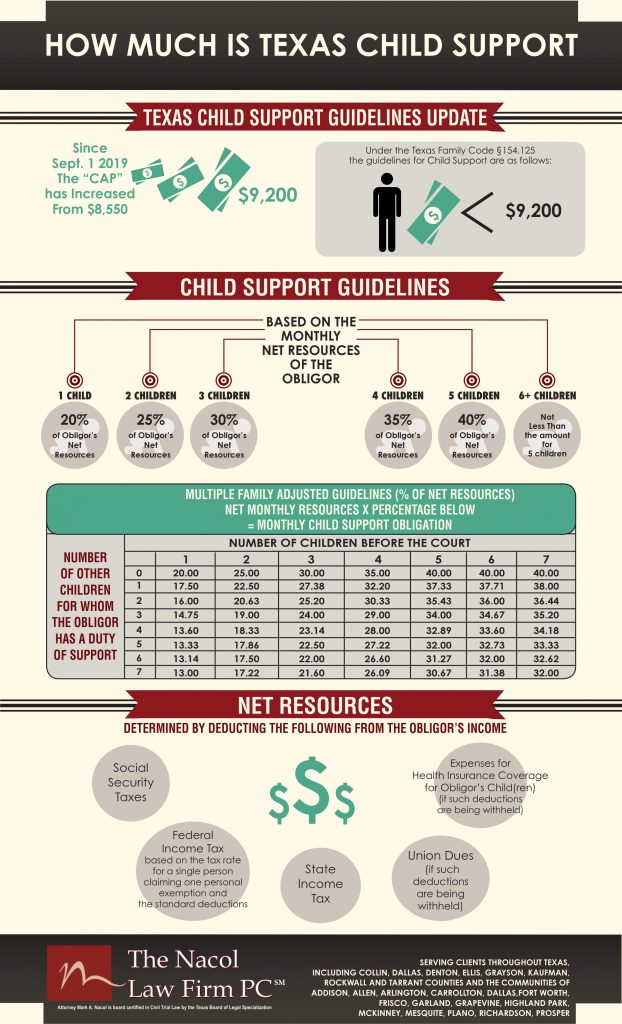Modification of Child Custody or Visitation Rights for Texas Fathers
Texas family law states that a court may modify a child custody order if the change is in the best interest of the child and one of the following applies:
1. The circumstances of the child or parent have materially or substantially changed since the date of the original child custody order or order to be modified.
2. The child is at least 12 years of age and will tell the court in private chambers with the judge that he/she would like a change.
3. The custodial parent has voluntarily given the child’s care and custody to another person for at least 6 months.
Material or Substantial Change
What could be acceptable as a change for the Texas family courts? Some examples could be a parent’s remarriage, a medical condition the affects a parent’s ability take care of the child, a parent’s criminal acts or convictions, a parent’s change in residence that makes visitation a hardship for the other parent, family violence, drug or alcohol related issues, absence of supervision, and other material changes concerning adequate care and supervision of the child.
Child Wants Change
The child must be at least 12years of age and maybe interviewed in the judge’s chambers. The court will consider the child’s desire but only make a change if it is in the child’s best interest.
Custody Relinquishment
This happens when the custodial parent has voluntarily given up custody of the child to another person for at least six months. This does not apply to a period of military deployment or duty.
After finding one of the three prerequisites, the court must still consider whether the change will be in the child’s best interest. The court will consider factors affecting the child’s physical, emotional, mental, education, social, moral or disciplinary welfare and development. The factors considered for this evaluation are:
1. Child’s emotional and physical needs.
2. Parenting ability of the conservators or potential conservators
3. Plans and outside resources available to persons seeking the modification
4. Value to the child of having a relationship with both parents
5. Visitation schedule that requires excessive traveling or prevents the child from engaging in school or social activities
6. Stability of the person’s home seeking the modification
7. The child’s desires
8. Child’s need for stability and need to limit additional litigation in child custody cases.
Modification within one year of prior court order
A parent who files a motion to modify a child custody order within one year after a prior order was entered must also submit an affidavit to the court. The affidavit must contain, along with supporting facts, at least one of the following allegations:
1. The child’s present environment may be endanger the child’s physical health or significantly impair the child’s emotional development.
2. The person who has the exclusive right to designate the child’s primacy residence is the person seeking or consenting to the modification and the modification is in the child’s best interest.
3. The person who has the exclusive right to designate the child’s primary residence has voluntarily relinquished the primacy care and possession of the child for at least six months and the modification is in the child’
Rights and Duties of a Parent – Joint Managing Conservator in Texas
Rights and Duties of a Parent – Joint Managing Conservator in Texas.
Waiver To the Guidelines is a Matter of Court Discretion
As a joint managing conservator of a child in a divorce proceeding in Texas, unless special circumstances arise justifying a variance from the Guidelines, the Court will normally order guideline code rights and duties and a parent will be awarded the following:
1.the right to receive information from any other conservator of the child concerning the health, education, and welfare of the child.
2.the right to confer with the other parent to the extent possible before making a decision concerning the health, education, and welfare of the child.
3.the right of access to medical, dental, psychological, and educational records of the child.
4.the right to consult with a physician, dentist, or psychologist of the child.
5.the right to consult with school officials concerning the child’s welfare and educational status, including school activities.
6.the right to attend school activities.
7.the right to be designated on the child’s records as a person to be notified in case of an emergency.
8.the right to consent to medical, dental, and surgical treatment during an emergency involving an immediate danger to the health and safety of the child.
9.the right to manage the estate of the child to the extent the estate has been created by the parent/conservator or the parent/conservator’s family.
10.the duty to inform the other conservator of the child in a timely manner of significant information concerning the health, education, and welfare of the child; and
11.the duty to inform the other conservator of the child if the conservator resides with for at least thirty days, marries, or intends to marry a person who the conservator knows is registered as a sex offender under chapter 62 of the Code of Criminal Procedure or is currently charged with an offense for which on conviction the person would be required to register under that chapter. IT IS ORDERED that this information shall be tendered in the form of a notice made as soon as practicable, but not later than the fortieth day after the date the conservator of the child begins to reside with the person or on the tenth day after the date the marriage occurs, as appropriate. IT IS ORDERED that the notice must include a description of the offense that is the basis of the person’s requirement to register as a sex offender or of the offense with which the person is charged. WARNING: A CONSERVATOR COMMITS AN OFFENSE PUNISHABLE AS A CLASS C MISDEMEANOR IF THE CONSERVATOR FAILS TO PROVIDE THIS NOTICE.
12.the duty of care, control, protection, and reasonable discipline of the child.
13.the duty to support the child, including providing the child with clothing, food, shelter, and medical and dental care not involving an invasive procedure.
14.the right to consent for the child to medical and dental care not involving an invasive procedure.
15.the right to direct the moral and religious training of the child.
16.Only one parent shall have the exclusive right to designate the primary residence of child in a specific geographical area, which is commonly the county in which the child currently resides and the contiguous counties thereto.
17.the right to consent to medical, dental, and surgical treatment involving invasive procedures may be subject to agreement, an independent right or an exclusive right;
18.the right to consent to psychiatric and psychological treatment of the child may be subject to agreement, an independent right or an exclusive right;
19.Only one parent shall have the exclusive right to receive and give receipt for periodic payments for the support of the child and to hold or disburse these funds for the benefit of the child;
20.the right to represent the child in legal action and to make other decisions of substantial legal significance concerning the child may be subject to agreement, an independent right or an exclusive right;
21.the right to consent to marriage and to enlistment in the armed forces of the United States may be subject to agreement, an independent right or an exclusive right;
22.the right to make decisions concerning the child’s education may be subject to agreement, an independent right a joint right or an exclusive right;
23.except as provided by section 264.0111 of the Texas Family Code, the right to the services and earnings of the child may be subject to agreement, an independent right or an exclusive right;
24.except when a guardian of the child’s estate or a guardian or attorney ad litem has been appointed for the child, the right to act as an agent of the child in relation to the child’s estate if the child’s action is required by a state, the United States, or a foreign government may be subject to agreement, an independent right or an exclusive right; and
25.the right to manage the estate of the child to the extent the estate has been created by community property or the joint property of the parent/conservator may be subject to agreement, an independent right or an exclusive right.
In accordance with section 153.001 of the Texas Family Code, it is the public policy of Texas to assure that children will have frequent and continuing contact with parents who have shown the ability to act in the best interest of the child, to provide a safe, stable, and nonviolent environment for the child, and to encourage parents to share in the rights and duties of raising their child after the parents have separated or dissolved their marriage. The Court will therefore normally establish the primary residence of the child in the county where the child currently resides and/or a contiguous county thereto, and the parties shall not remove the child from such county for the purpose of changing the primary residence of child until there is a modification to the existing order of the court of continuing jurisdiction or a written agreement signed by the parties and filed with the court.
The geographical restriction on the residence of the child may be lifted or modified if, at the time the primary parent with the right to establish residence wishes to remove the child from the county for the purpose of changing the primary residence of the child, the other parent does not reside in that county or a contiguous county thereto.
Time constraints, employment issues of the primary Joint Managing Conservator, and other material factors may come into play when a Joint Managing Conservator requests waiver of the geographical restrictions. It customarily is a very difficult, but not always insurmountable, burden to achieve a geographical restriction waiver. The success, consistency and regularity of the non-primary conservator’s possession and access to the child is a factor the court will view in making a ruling. Frequently, an agreement to adjust the amount of support and/or transportation costs comes into play in resolving such disputes.
Step Parent Conflict – Put Your Kids First!
Thirty seven percent of families in the United States are blended families. Sixty percent of second marriages end in divorce. A biological parent has his hands full, but as most step-parents will tell you, their job is even more complicated.
Following a divorce, it is not uncommon for a new step-parent to become the target of unprovoked spite or anger. In many cases, the previous-spouse harbors unfounded fears that their child will look to a new step-parent as a mother or father replacement figure. This can engender resentment to what may already be an uncomfortable situation between parties. Regretfully, these issues often escalate very quickly. Such resentments place the children squarely in the middle of a bitter fight between the people they love the most and are not healthy for anyone involved. The pain of conflicting loyalties to each parent and a child’s feeling of being “caught in the middle” of such disputes exacts an enormous emotional toll on a child. When a parent is in a rage, it is not uncommon for a child to withdraw. The child’s behavior towards the non-primary parent may abruptly change. This change in behavior may have more to do with keeping the primary parent happy than it does with how they really feel about the non-primary parent or step-parent. It is essential that you make it clear to your child that you love them and will always be there for them, regardless of the emotional or less than rosy current circumstances.
It is crucial to a child’s self-esteem and emotional growth that parents avoid putting children in the middle of such disputes. This can be incredibly difficult, however, when a selfish or manipulative parent does not think twice about wrongfully placing his or her child in the middle of conflict. Children are very perceptive and as they grow older they will ultimately realize when a parent has lied to them and used them for their own emotional or financial gain. Though they may temporarily identify with the aggressors, in time they will deeply resent the parent who has manipulated them.
Regardless of the circumstances, it is critical that biological parents avoid arguments or conflicts in the presence of the children. Such conduct is conducive to parental alienation goals of the misguided previous spouse. If the child sees that you maintain a calm and collected demeanor, it gives them reason to pause and feel safe.
If a previous spouse is making statements to the child regarding issues that should only be discussed between adults, tell the child that such discussions are inappropriate and you will take them up with the other parent at another time.
It is ok to tell your child “I am sorry,” if they are upset, even if you are not the parent upsetting them. This validates that they are hurting and relieves any false guilt they may have over things that are being said and done when you are not present. It is sometimes helpful to use everyday situations to explain conflict to your child. As an example, when dealing with conflict explain that “brothers and sisters fight, but they still love each other. Families have to work through conflict in order to stay together. I would not leave you if you made a mistake, I would not want you to leave me.” Such statements reinforces that reasonable conflict is ok and assures the child that you will remain a constant force in their life regardless of the situation.
If you feel that the conflict has escalated to a point of becoming emotionally abusive and/or destructive to the child, consult a Family Law / divorce attorney. It may be in the best interest of the child that he or she be removed from the primary parent and placed with the non-primary parent so that he or she is allowed to love all parental figures, parents and step-parents alike, unconditionally.
How Much is Texas Child Support? Texas Child Support Guidelines
Effective September 1, 2019 The Texas Child Support Division of the Attorney General increased the Maximum child Support under the Texas Child Support Guidelines from $8,550 to the “new cap”of net monthly resources to $9200 annually. This change in the law will increase the amount of maximum child support from of $1,710.00 to $1,840.00 monthly (20% of $9200. For one child)
Texas Family Code §154.125(a)(1) requires that every six years the presumptive amount of net resources to which the child support guidelines apply shall be reviewed and adjusted for inflation by the Texas Office of the Texas Attorney General (OAG). That section sets out the formula for doing so based on the consumer price index. The last adjustment was done in 2013 when the current amount of $8550 per month was established.
How does the “cap” work and what could this mean for you? If your net monthly resources are less than $8,550, the child support obligation will not change on Sept. 1. You are under the “current cap” and lower than the “new cap”. All stays the same.
If you are currently going through litigation and your net monthly resources exceeds $8,550 and the Court orders child support prior to September 1, 2019, Texas Child Support Guidelines will mandate that the Court apply the appropriate child support percentage to the first $8,550 in net monthly resources based on the number of children. But, if the Court orders child support after September 1, 2019, it will apply the new appropriate child support percentage to the first $9,200 in net monthly resources.
Child support under the guidelines is determined by applying the applicable percentage, beginning at 20% for one child and increasing incrementally for each additional child, to the net resources amount. If a child support obligor has monthly net resources over $9200, a party seeking above the guideline’s child support has the burden of proving to the court that additional support should be ordered according to factors set out in Texas Family Code §154.126.
Important to Know: The new “cap” increase of September 1, 2019 will not automatically increase the obligor’s existing child support obligation. Any change in child support standing before September 1, 2019, can only occur through the court with a modification order to increase the child support to the new “Cap” amount of $9200. After September 1, 2019, any new suit for child support will be subject to the new “cap”.
Please review the Texas Office of the Texas Attorney General (OAG) website for a child support calculator for the new breakdown: https://csapps.oag.texas.gov/monthly-child-support-calculator

The Nacol Law Firm PC
8144 Walnut Hill Lane
Suite #1190
Dallas, Texas 75231
Nacollawfirm.com
Texas Divorce and My Children : What Are My Fathers Rights?
In our world today many fathers are facing a regrettable and inevitable DIVORCE! Either through Mom’s decision or Dad’s, it may be the end of a joint family life that includes both parents in one residence. No one is ever happy, but by doing some research and trying to make reasonable decisions, fathers will persevere and hopefully you will be able to maintain your loving relationship with your children and family.
Some things to remember:
-
- Your children love you and just because you are no longer living with their mom, doesn’t change your love. You keep your opinions to yourself and not share all your adult thoughts with your children. YOU LOVE THEM AND ALWAYS WILL! NOTHING HAS CHANGED IN YOUR INTEREST OR LOVE FOR YOUR Children. Mom is no longer in your home and love with the children. She has her own relationship with the family now.
-
- You do have definite rights to your children. When the decision has been made to file for divorce, employ an experienced attorney to help guide you through this process. Negative statements, even when true, ARE NOT HELPFUL! Uninformed opinions from your soon to be ex, concerning your rights with the children, are suspect, since you now are on opposing sides. A very knowledgeable Fathers Rights Attorney is up to date on all current issues in Fathers Rights domestic litigation and the courts, and this is who you should listen to for guidance.
-
- As the divorce proceeds and behaviors by the divorcing couple become hostile and estranged, just remember that self-control and acting rationally, without anger, will help in eliminating future ammunition to be used against you in the divorce and custody case. Self-control in your behavior and attitude will help you keep an upper hand in the Divorce proceeding and help the outcome.
- Finally, you are not the victim! Don’t lay down dead and let Mom run over you! There is life after the death of a marriage and you will learn that not only may your life be better, but your life with your children will be enhanced! The children will have watched you act like an adult and parent who loves them and wants the best for them, but also wants a good life with them in the after-divorce life.
Now the Divorce process has begun. Either you or your wife have “Lawyered Up” and the Legal Process has begun! Some very good advice to consider following at the beginning of a Divorce:
- Get your financial documents in order: Review our blog “Prepare for Your Divorce” to start getting ready in the financial part of the divorce. Subject to the outstanding standing order of the court, be sure to protect all joint bank accounts and open new ones for your individual use. Also, if indicated and necessary, delete spouse from all your credit and charge cards.
- Depending on the age, meet with your children and discuss what is happening to your family. Make sure they know that your relationship with them will never change and you will always be their father and show this by loving actions and affections. Confirm that you are divorcing their Mother, not them.
- Stay on your best behavior during this stressful time. Watch your consumption of alcohol intake and try to stay in good company. You need to show that you are not the aggressor. Never let Mom provoke you into a stressful situation where you may engage in a public spectacle with any form of emotional, physical or sexual abuse against Mom or others. The Judge or jury would not be impressed!
- If you have not hired an attorney, now is the time to “lawyer up”. You need to find a competent attorney who has a good reputation dealing with fathers and their rights to their children. Look on legal websites and blogs to see if an attorney relates to your legal needs. Check on fathers’ rights blogs and see if an attorney has answered questions about a similar family situation as yours and has suggested good solutions to help resolve the issues. Give this attorney a call and set up a consultation to see if he/she would be a fit for your legal need.
- If life and divorce pressures are making you depressed, search out for help with supportive family or friends, clergy or professional counselors. Studies have concluded that Divorce is one of the most stressful events in an individual’s life. Get the support you need to be able to make wise decisions and to promote honest interaction with others during this most stressful time.
Like death, Divorce is one of life’s worst events. Know that this difficult time will someday be over, but also along this path there will be unknown surprises and events, that will test your honesty and dignity as a father and a parent. But in the end, you will make it and still be the father that you need to be to your children.
Stay Calm. This too shall pass….
Nacol Law Firm P.C.
Dallas Fathers Rights Attorneys







